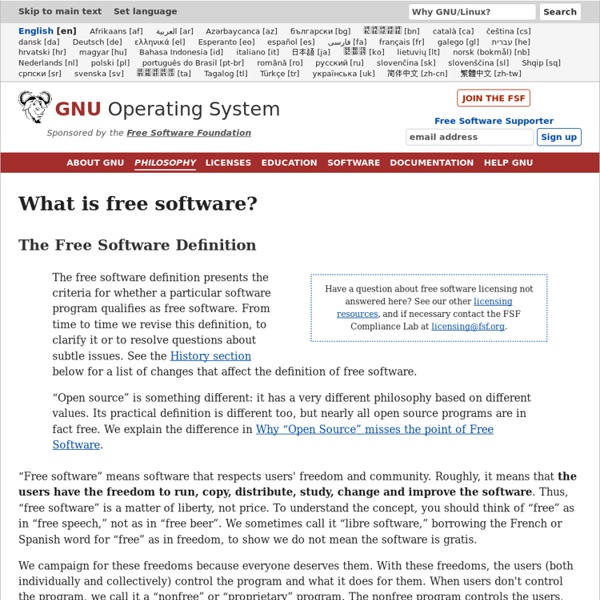Le manifeste GNU
The GNU Manifesto (which appears below) was written by Richard Stallman in 1985 to ask for support in developing the GNU operating system. Part of the text was taken from the original announcement of 1983. Through 1987, it was updated in minor ways to account for developments; since then, it seems best to leave it unchanged. Since that time, we have learned about certain common misunderstandings that different wording could help avoid. Footnotes added since 1993 help clarify these points.
Free software is a matter of liberty, not price
As our society grows more dependent on computers, the software we run is of critical importance to securing the future of a free society. Free software is about having control over the technology we use in our homes, schools and businesses, where computers work for our individual and communal benefit, not for proprietary software companies or governments who might seek to restrict and monitor us. The Free Software Foundation exclusively uses free software to perform its work. The Free Software Foundation is working to secure freedom for computer users by promoting the development and use of free (as in freedom) software and documentation—particularly the GNU operating system—and by campaigning against threats to computer user freedom like Digital Restrictions Management (DRM) and software patents. Our Core Work
Guide rapide de la GPLv3 - Projet GNU - Free Software Foundation (FSF)
by Brett Smith [This article is also available in PDF and reStructuredText formats.] After a year and a half of public consultation, thousands of comments, and four drafts, version 3 of the GNU General Public License (GPLv3) was finally published on June 29, 2007. While there's been a lot of discussion about the license since the first draft appeared, not many people have talked about the benefits that it provides developers.
Pourquoi l'« open source » passe à coté du problème que soulève le logiciel libre
by Richard Stallman When we call software “free,” we mean that it respects the users' essential freedoms: the freedom to run it, to study and change it, and to redistribute copies with or without changes. This is a matter of freedom, not price, so think of “free speech,” not “free beer.” These freedoms are vitally important. They are essential, not just for the individual users' sake, but for society as a whole because they promote social solidarity—that is, sharing and cooperation.
Linux et GNU
by Richard Stallman Many computer users run a modified version of the GNU system every day, without realizing it. Through a peculiar turn of events, the version of GNU which is widely used today is often called “Linux”, and many of its users are not aware that it is basically the GNU system, developed by the GNU Project. There really is a Linux, and these people are using it, but it is just a part of the system they use.
The History of Tux the Linux Penguin - Wikiid
[Tux] "...looks too much like Homer Simpson" -- Albert Cahalan. ...Just when you thought that Tux was about as cute as he could possibly be... Thanks to Paul and Eleya Frields for these photos of Evelyn-the-Penguin. So cute!



